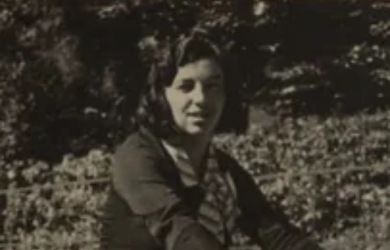 Marta Reik was born into poverty in the Banská Bystrica region of Slovakia, and was required to support her family from a young age. In 1932, she joined Hashomer Hatzair, and quickly became an active member of the Zionist movement.
Marta Reik was born into poverty in the Banská Bystrica region of Slovakia, and was required to support her family from a young age. In 1932, she joined Hashomer Hatzair, and quickly became an active member of the Zionist movement.
When war broke out, she returned from an agricultural training program in Bratislava in order to lend a hand to Jewish refugees in Slovakia. Inspired by the Zionist movement, Reik began raising funds for aid and organising illegal immigration to Palestine.
In 1939, she immigrated to Palestine, meeting up with a group who would eventually establish Kibbutz Ma’anit. It was then that she changed her name to Haviva. Reik was an energetic young woman, requesting the most physically laborious jobs, including the citrus orchards, the vineyards, and the banana groves. It was in the banana groves of a local kibbutz where she met and fell in love with Zvi Arison, who she married.
Reik was very loving and devoted to others, an attribute which was reflected in the work she did. She coordinated female workers and was active in a group for working mothers, which she represented at a conference of female workers. In 1942, Reik volunteered for the Palmach and participated in military exercises throughout Palestine. Two years later, she enlisted in the British air force and was sent to Cairo for training. There, she learned how to parachute, operate radio transmitters, and execute espionage and commando operations. In a letter to a friend, she wrote: "There is much I still wish to achieve in this short life. I hope it is not too late…I do not feel I have been idle in life. I regret only one thing: that I robbed myself of the joy of motherhood."
The paratroopers from the Jewish Yishuv in Palestine were charged with penetrating their home countries, where they could easily blend in with the local population. The Slovakian group of paratroopers, which included Reik, Rafael Weiss, and Zvi Ben-Yaakov, were the last to depart Egypt for Slovakia. In August 1944, the Slovak National Uprising began. Two days prior, the Slovakian group were transported by plane to Bari, Italy, and these events threw a wrench in their plans.
Reik did not give up on her mission. At the synagogue in Bari, she learned that a U.S. military delegation was to be dispatched to the liberated territory. She managed to convince a Jewish officer of this delegation of her value to the cause – her knowledge of the area and the local language made her an ideal guide. Thus, she was added to the delegation. When packing her bag for the mission, she rid herself of any belonging that might link her back to Palestine, except for a copy of a Hebrew book on female members of kibbutzim. This book was clearly dear to her, containing a collection of articles, stories, and other writings by female kibbutz members.
In September 1944, an American plane carrying the U.S. delegation and Reik’s team touched down in Banská Bystrica. Reik and her comrades immediately began work, supporting the Jews who had been released from the forced labour camps in the region. Within a short time, they assembled a group of Jewish resistors and began to make their way to the rebel headquarters in the mountains. During this trek, they mistook a set of voices for Russian partisans, and revealed themselves. Unfortunately, the voices belonged to soldiers of the Ukranian Galicia Division of the Waffen-S.S, and the three paratroopers were taken prisoner and handed over to the Nazis.
Reik and Weiss were taken into custory and jailed in the Banská Bystrica prison. In November 1944, they were executed in the town of Kremnizka among 200 Jews, Partisans, and Romani. After the war, the bodies of the Jewish paratroopers from Palestine were exhumed from their temporary grave, and reinterred in the British military cemetery in Prague. In October, 1952, Reik’s body was returned to Israel and she was buried in Jerusalem.
Milena Jesenska & Margarete Buber-Neumann